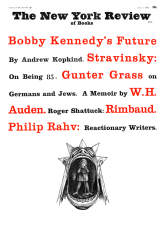In response to:
The Classical Cold War from the March 23, 1967 issue
Dr. Finley [NYR, March 23] finds my views “naive trivia.” But is the picture I present of Aeschylus as a liberal, anti-traditionalist, supporter of Themistocles, friend of political reform, really so naive or trivial as all that? There are many, some even among Dr. Finley’s own colleagues, who believe in an Aeschylus who was conservative, even reactionary, in matters of politics and religion. “Naive” and “trivial” are, after all, relative terms: an attempt to unravel the tangled political threads that run through fifth-century Greek tragedy may, indeed, seem “of minor importance” from the exalted reaches of the Jesus high table, or the wide vantage-point of problems in Homeric land tenure.
Much of what John Jones has to say about Aeschylus seemed to me worth saying, but as it was not directly relevant to my political theme, it seemed unnecessary to mention his book in my already copious notes. One final point (trivial, perhaps, but truth has its own claims). Familiarity with the Persians would have saved Dr. Finley from the error of citing line 242 (“slaves of no one nor subject to any man”) as coming “from a chorus in Aeschylus’ Persians;” of course the line occurs in a dialogue exchange between the chorus leader and the Queen.
Anthony J. Podlecki
Pennsylvania State University,
University Place, Pennsylvania.
M.I Finley replies:
I am sorry about the slip. I should not have written “after quoting from a chorus” but should instead have used Dr. Podlecki’s own words (p. 9), “as the chorus says.” The closing sentences of my review, duly corrected, should therefore read as follows: “If we must have naive trivia, I prefer Dr. Podlecki’s. After quoting the chorus in Aeschylus’s Persians that Athens is not a nation of sheep, slaves of no one, he comments: ‘How could the audience not have thrilled to these words?’ “
This Issue
June 1, 1967



